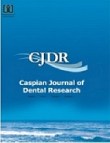Effect of sodium fluoride in fifth-generation adhesive (Solobond M) on microleakage and dentin type I collagen content
The purpose of this study was to evaluate the addition of sodium fluoride to fifth-generation adhesive (Solobond M) on the degree of microleakage and type I collagen content of dentin.
The present in vitro study was conducted on 120 orthodontically extracted human premolars devoid of decay and anatomical defects. Two series of 20 premolars were selected to test immunohistochemistry (IHC) and two series of 40 premolars to evaluate microleakage in two time points of 24 hours and 3 months. In both tests and at both time points, the tests were performed on the samples divided into four groups: 1-control (only Solobond M), 2-bonding group (Solobond M) containing fluoride, 3-bonding group (Solobond M) containing Chlorhexidine (CHX) after acid etching, and 4-bonding group (Solobond M) containing fluoride+CHX after acid etching.
The IHC score at 24 hours and 3 months was significantly higher in the CHX, Fluoride, and Fluoride+CHX groups compared to the control group. The IHC score in the CHX+fluoride group was higher than that in the CHX group (p=0.04). The degree of microleakage at 24 hours and 3 months was significantly lower in the Fluoride+CHX and Fluoride groups compared to the control group. The degree of microleakage in the Fluoride group was lower than in the CHX group. The IHC score and the microleakage degree had no significant difference in 24 hours and 3 months between the Fluoride+CHX, Fluoride and CHX groups.
It seems that the effect of fluoride on non-degradation of collagen is greater than that of the CHX.
-
Effect of 4-META on microtensile bond strength of cements to ceramics
Maliheh Nafisifard, *, Laleh Soleimani, Faraneh Mokhtarpour
Dental Research Journal, Feb 2024 -
Tensile strength, flexural strength, and deflection analysis of three types of fixed lingual retainers in laboratory settings: A comparative study
Afsaneh Ghorbani, Sedigheh Sheikhzadeh*, Homayoun Alaghehmand, Valiollah Arash, Ali Seyyed Majidi
Journal of Dental Medicine,


